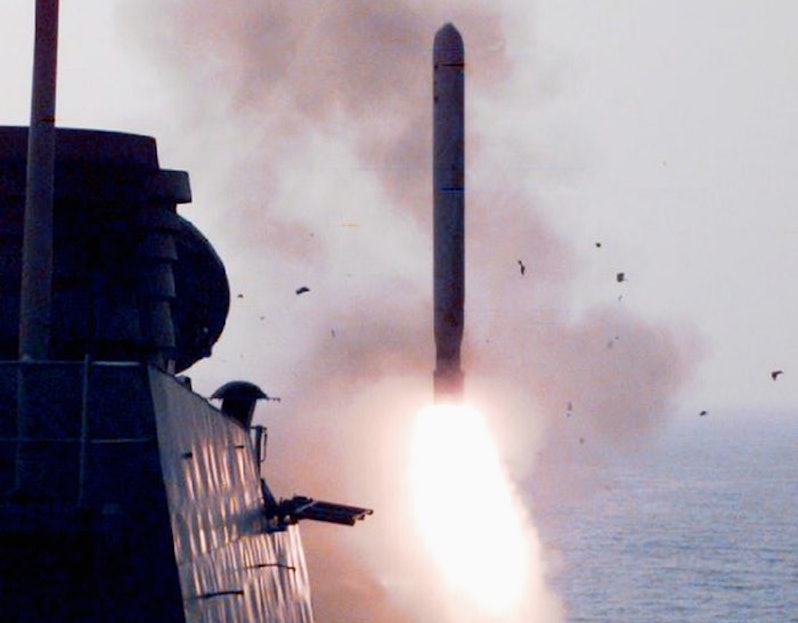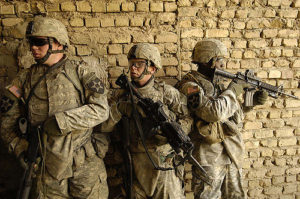Donald Trump’s Syria Attack Tramples Many Laws
President Trump's assault on Syria was illegal under both U.S. and international law, and the American mainstream media's celebration of his rush to judgment sent him a frightening message: Bombing makes you popular. A Tomahawk missile launches from a U.S. Navy vessel in this undated photo. (U.S. Navy)
1
2
A Tomahawk missile launches from a U.S. Navy vessel in this undated photo. (U.S. Navy)
1
2
Trump’s humanitarian claim also does not pass the straight face test, in light of his Muslim Ban excluding all Syrian refugees from entry into the United States (halted by the courts, for now). Since the conflict in Syria began in 2011, more than 400,000 Syrians have been killed. Five million people are refugees. If Trump were indeed motivated by humanitarian concerns, he would embrace those seeking to escape the carnage in Syria, which he has emphatically not done.
The 1980 Refugee Act grants the President authority to determine how many refugees may be admitted to the United States. The President must consider whether “the admission of certain refugees in response to the emergency refugee situation is justified by grave humanitarian concerns or is otherwise in the national interest.”
When, during the presidential campaign, Trump said he wanted to ban all Syrian refugees from entering the U.S., he was asked if he could then “look children aged five, eight, ten, in the face and tell them they can’t go to school here.” Without skipping a beat, Trump replied, “I can look in their faces and say, ‘You can’t come’. I’ll look them in the face.” Spoken like a true humanitarian.
Trump’s new-found humanitarian concerns, including his lament about the terrible fate of Khan Sheikhoun’s “small children and even beautiful little babies,” also stand in contrast to the horrific death toll from other U.S.-allied bombings in recent weeks. The U.S.-led coalition in Iraq and Syria killed nearly 1,000 non-combatants in March alone, “a record claim,” according to Airwars.org, a non-profit organization that monitors civilian casualties from airstrikes in the Middle East. “These reported casualty levels are comparable with some of the worst periods of Russian activity in Syria,” the group said.
The coalition forces’ use of white phosphorous, a chemical weapon that burns to the bone, has been documented in Mosul, Iraq. And the U.S. Central Command confirmed that it has used depleted uranium, arguably a war crime, against ISIS in Syria.
Encouraging Trump to Use Military Force
Trump is obsessed with being liked. So, smarting from the healthcare loss and attacked by the media, the GOP’s right-wing and Democrats, Trump turned the tables. Now that he’s become Bomber-in-Chief, Trump is liked by nearly everybody – or so it seems. And what lesson will he learn from his missile attack? That being a strong, forceful leader makes people like you. And blowing things up makes you a “strong, forceful leader.”
Members of the Trump administration are sending mixed signals about whether they seek to forcibly change the Assad regime in Syria. That would violate the International Covenant on Civil and Political Rights, which the United States has also ratified.
During the U.N. Security Council meeting following Trump’s missile attack, the ambassador from Bolivia declared, “The United States has not only unilaterally attacked . . . [it] has become that investigator, has become the prosecutor, has become the judge, has become the jury. Whereas the investigation would have allowed us to establish in an objective manner who is responsible for the attacks, this is an extreme violation of international law.”
Trump’s missile attack also has put a dangerous strain on U.S. relations with nuclear-armed Russia, which supports the Assad regime in the conflict with various opposition groups, including Al Qaeda’s affiliate and its spinoff, Islamic State or ISIS.
Following the April 6 missile strike, Russia suspended a memorandum of understanding designed to minimize collisions between U.S. and Russian aircraft over Syrian airspace. A statement issued by Russia, Iran and Assad’s forces said, “What America waged in an aggression on Syria is a crossing of red lines. From now on we will respond with force to any aggressor or any breach of red lines from whoever it is and America knows our ability to respond well.”
With his missile attack, Trump has made the world a much more dangerous place. “Make no mistake,” Norman Solomon wrote. “With 90 percent of the world’s nuclear weapons at the ready in the United States and Russia, pushing to heighten tensions between the two countries is playing with thermonuclear fire.”
Where Will Trump Bomb Next?
Meanwhile, Trump is taking provocative measures against nuclear-armed North Korea, deploying an aircraft carrier and several warships to the Korean Peninsula. Trump’s show of force is a response to North Korea’s recent ballistic missile test.
The Trump administration has indicated it may use pre-emptive strikes to prevent North Korea from developing a missile that could carry a nuclear warhead to the United States. Pre-emptive strikes violate the U.N. Charter, which specifies several non-forceful measures, including diplomacy, to maintain or restore international peace and security. But diplomacy doesn’t seem to be in Trump’s toolkit.
North Korea warned of “catastrophic consequences of [the United States’] outrageous actions.” Pyongyang said, “We will take the toughest counteraction against the provocateurs in order to defend ourselves by powerful force of arms.” A foreign ministry spokesman said North Korea “is ready to react to any mode of war desired by the US.”
When Secretary of State Rex Tillerson appeared on ABC’s “This Week,” he cited the U.S. strike on Syria as a not-so-veiled warning to North Korea: “The message that any nation can take is if you violate international norms, if you violate international agreements, if you fail to live up to commitments, if you become a threat to others, at some point, a response is likely to be undertaken.”
By logical extension, Trump’s missile attack on Syria makes the United States vulnerable to retaliation from other countries that see the U.S. violating international law and committing acts of aggression.
What can be done to stop the Trump administration’s illegal use of military force in Syria and its dangerous provocation of Russia and North Korea?
Your support matters…
SUPPORT TRUTHDIG
Independent journalism is under threat and overshadowed by heavily funded mainstream media.
You can help level the playing field. Become a member.
Your tax-deductible contribution keeps us digging beneath the headlines to give you thought-provoking, investigative reporting and analysis that unearths what's really happening- without compromise.
Give today to support our courageous, independent journalists.




You need to be a supporter to comment.
There are currently no responses to this article.
Be the first to respond.